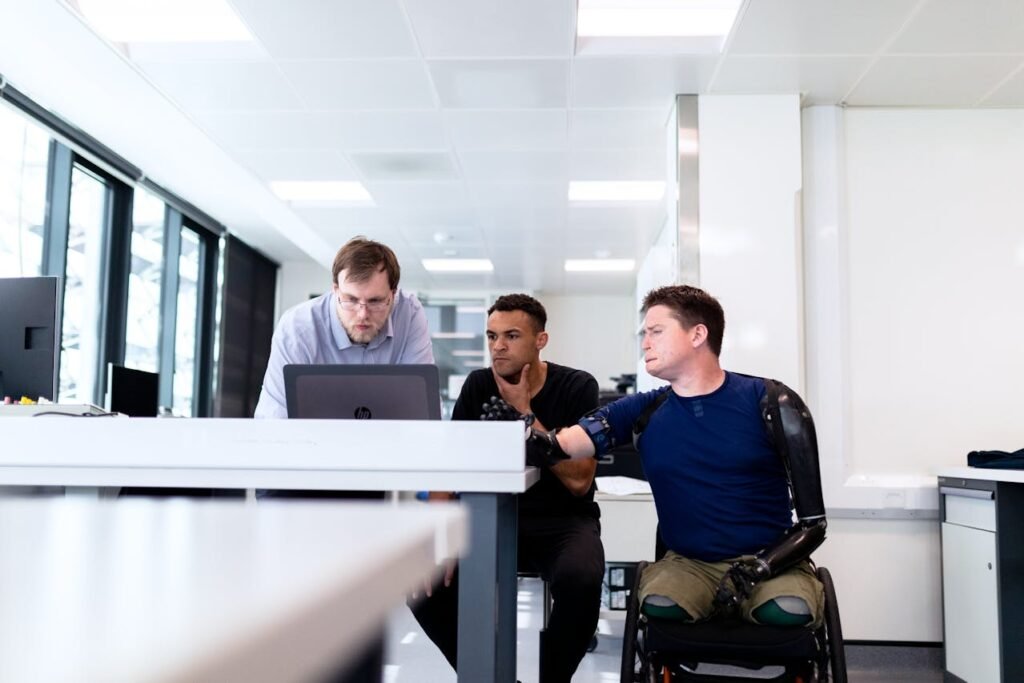War veterans embody courage and resilience, having faced challenges few of us can imagine. Yet, for many, the aftermath of their service brings new battles—coping with limb loss and adjusting to life with prosthetics. Each veteran’s story is unique, shaped by their experiences, injuries, and aspirations. This individuality demands prosthetic solutions that go beyond standard offerings, focusing instead on personalized designs and advanced functionality.
At Robobionics, we understand the profound need for tailored prosthetics that empower veterans to reclaim their independence and embrace a fulfilling life. This article explores the specific needs of war veterans, the role of modern prosthetics, and how innovative solutions like Grippy™ can transform lives.
Understanding the Unique Needs of War Veterans
War veterans face a variety of physical and emotional challenges after their service. Among these, limb loss often stands out as a life-altering condition that impacts mobility, independence, and confidence. Unlike other prosthetic users, veterans’ needs are shaped by their service experiences, the severity of their injuries, and the demands of reintegrating into civilian life.
Physical Needs
War-related injuries can range from single-limb amputations to complex multi-limb losses. The nature of these injuries often requires prosthetics that are not only durable but also versatile.
Veterans may need devices capable of handling intense physical activities like hiking, sports, or manual labor. At the same time, the prosthetics must be lightweight and ergonomic for everyday comfort.
Robobionics addresses these needs through advanced materials and thoughtful designs. Products like Grippy™ are engineered to balance strength and comfort, ensuring they are both functional and practical for daily use.
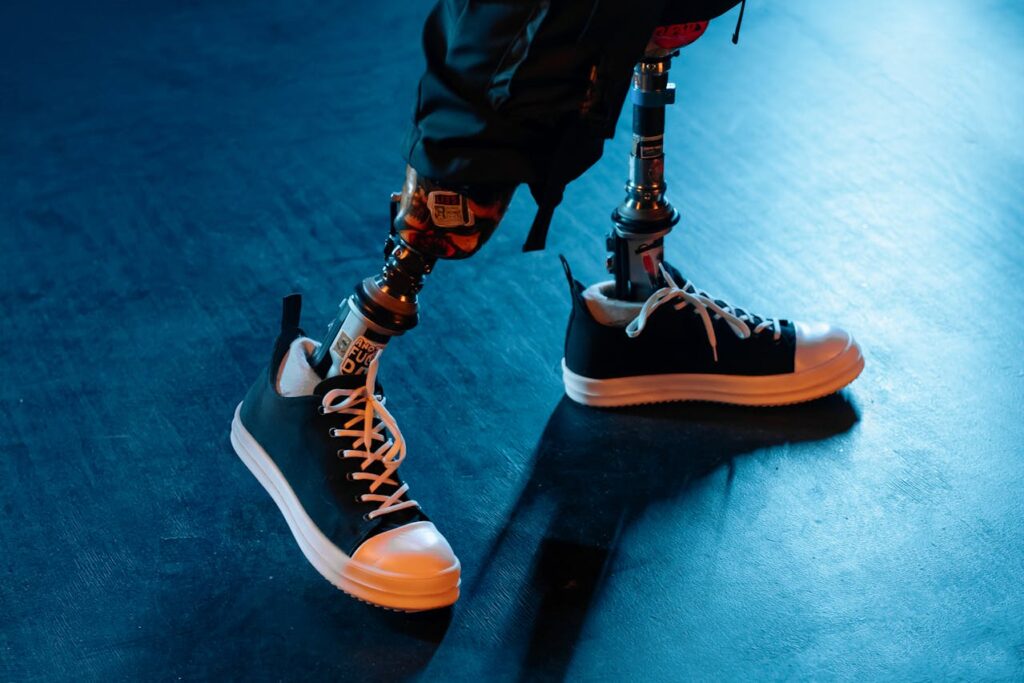
Emotional Needs
The journey to acceptance after limb loss is deeply personal and often intertwined with a veteran’s sense of identity and purpose. Many veterans initially struggle with the emotional impact of using prosthetics.
They need devices that not only restore functionality but also boost their confidence. A prosthetic that looks natural or allows users to engage in hobbies or work can significantly enhance their self-esteem.
Robobionics incorporates feedback from veterans to design solutions that feel like natural extensions of their abilities. Through gamified rehabilitation programs, we also help veterans adapt to their new devices in a supportive and empowering environment.
The Role of Advanced Prosthetics in Veterans’ Lives
Modern prosthetics are much more than mechanical tools—they’re life-enhancing technologies designed to restore freedom. For war veterans, the right prosthetic can bridge the gap between physical limitations and the life they aspire to live.
Functionality Meets Innovation
Today’s prosthetics are equipped with advanced features like multi-grip hands, sensor-based feedback, and improved control systems.
These enhancements allow veterans to perform intricate tasks, whether it’s holding a cup of coffee or typing on a keyboard. Grippy™, for example, provides a precise sense of touch and movement, making it ideal for veterans who require fine motor control.
Customization for Individual Lifestyles
No two veterans are the same, and their prosthetics shouldn’t be either. Customization is key to ensuring the device fits seamlessly into their lifestyle.
Whether a veteran is an athlete, an artist, or simply someone who values their independence, their prosthetic should align with their specific goals. Robobionics offers a structured approach, from evaluations to trials, to guarantee the perfect fit.
Rehabilitation and Adaptation
Prosthetic use is a journey, not an immediate transformation. Veterans need structured rehabilitation to adjust to their devices.
Robobionics’ gamified rehabilitation programs make this process engaging and motivating. By turning adaptation into a series of achievable milestones, veterans can build skills and confidence at their own pace.
Empowering Veterans with Robobionics
Robobionics is committed to improving the quality of life for war veterans through innovative prosthetic solutions. Each product we create reflects a deep understanding of the challenges veterans face and a dedication to meeting those challenges with empathy and expertise.
Why Choose Robobionics?
Unlike imported alternatives, Robobionics offers locally designed prosthetics that combine advanced technology with cost-effectiveness.
This ensures that veterans receive faster, more accessible support when they need it most. Our NABL-certified products meet stringent safety standards, ensuring reliability and performance.
Comprehensive Support Services
From initial evaluation to final fitment, we guide veterans through every step of their prosthetic journey. Our network of authorized clinics, including Omnify Prosthetics, ensures accessible services.
Veterans can also count on us for ongoing repair and maintenance, making their transition to prosthetic use as seamless as possible.
Partnering with Rehabilitation Experts
One of the most impactful ways to empower veterans is by fostering collaborations between prosthetics providers and rehabilitation experts. Robobionics actively partners with physical therapists, occupational therapists, and mental health professionals to deliver a holistic recovery experience.
This ensures veterans receive not just a prosthetic but a comprehensive plan tailored to their physical and emotional needs.
Leveraging Data for Personalization
Empowering veterans requires an in-depth understanding of their unique requirements. Robobionics uses advanced diagnostic tools to analyze individual needs and preferences, ensuring each prosthetic is customized for optimal performance.
From activity levels to environmental factors, every detail is considered during the design and fitting process.
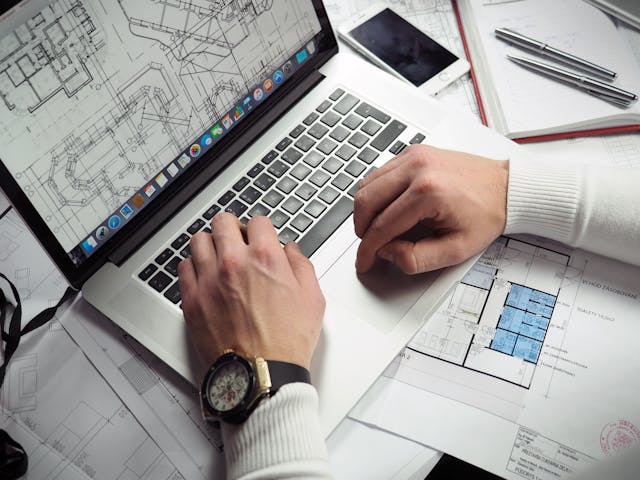
Fostering Emotional Resilience
The transition to life with a prosthetic can be emotionally challenging for veterans. Robobionics emphasizes the importance of providing emotional support through peer networks, counseling, and community events.
These initiatives create safe spaces for veterans to share their experiences, celebrate milestones, and find encouragement in their journey.
Supporting Skill Development and Employment
For many veterans, finding meaningful employment after service is a key step toward rebuilding their lives. Prosthetics can play a crucial role in helping them acquire new skills or return to work.
Robobionics supports this by designing devices that enable veterans to excel in diverse roles, from manual labor to desk jobs.
Expanding Awareness Through Advocacy
Awareness is a powerful tool in empowering veterans. Robobionics champions causes that highlight the challenges and triumphs of veterans adapting to prosthetics.
By working with organizations, policymakers, and influencers, we advocate for improved access to prosthetic technology and support services.
Innovations in Prosthetic Technology
At Robobionics, innovation is at the heart of empowering veterans. From sensor-driven feedback systems to AI-enhanced motion controls, we are constantly exploring new technologies to improve prosthetic functionality.
These advancements help veterans perform tasks with greater ease and confidence, redefining their possibilities.
Overcoming Challenges in Prosthetic Adoption
Transitioning to prosthetic use can be daunting, especially for war veterans who are adjusting to life after service. This process involves navigating several challenges, both physical and emotional, to fully embrace the independence that prosthetics can offer.
Building Comfort and Confidence
One of the primary hurdles veterans face is the initial discomfort of wearing and using a prosthetic. Many find the devices unfamiliar, and it can take time to develop the strength and coordination required for effective use.
That’s why Robobionics prioritizes ergonomic designs that reduce strain and improve comfort from day one.
Confidence is equally crucial. Veterans often need reassurance that their prosthetic will perform reliably in various scenarios, from routine tasks to more demanding activities.
At Robobionics, we provide a demo and trial phase to help veterans experience the benefits of their prosthetic before committing. This hands-on approach fosters trust and eases the transition.
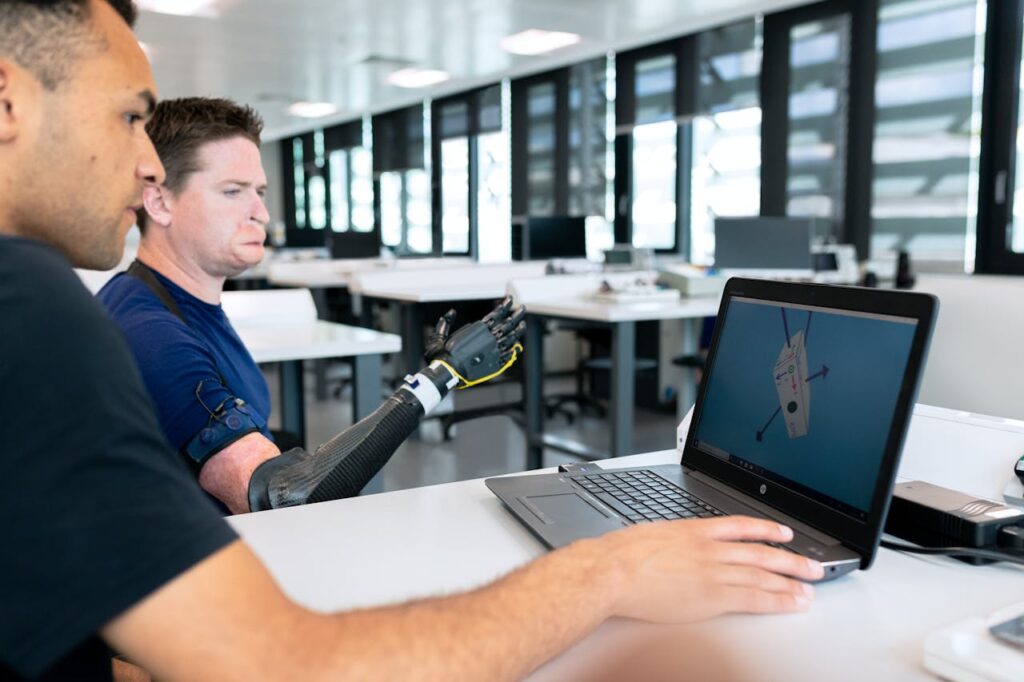
Addressing Accessibility Barriers
Cost and accessibility often stand as barriers for veterans seeking high-quality prosthetics. Imported devices can be prohibitively expensive, with limited local support for repairs or replacements.
Robobionics addresses these concerns by offering Make in India solutions that are both affordable and serviceable locally. Veterans receive faster assistance, minimizing downtime and maximizing their quality of life.
The Role of Rehabilitation
Rehabilitation is a cornerstone of successful prosthetic adoption. For veterans, it’s not just about learning to use the device—it’s about regaining autonomy and rediscovering their capabilities. Robobionics’ gamified rehabilitation programs transform this process into an engaging journey.
Through interactive exercises and activities, veterans develop the skills they need to thrive with their prosthetics.
The Psychological Impact of Limb Loss
Limb loss can leave a lasting psychological impact, especially for war veterans who often associate their physical capabilities with their sense of identity. Adjusting to a prosthetic is as much a mental challenge as it is a physical one.
Understanding Trauma and Its Effects
For many veterans, losing a limb is tied to traumatic events experienced in service. This trauma can manifest as anxiety, depression, or even post-traumatic stress disorder (PTSD). Veterans often grapple with feelings of loss—not just of a limb but of identity, autonomy, and their previous way of life.
The transition to prosthetic use can either alleviate or exacerbate these emotions, depending on the level of care and support they receive.
Strategically, businesses must recognize that prosthetic adoption isn’t merely a technical adjustment but an emotional one. A supportive approach, emphasizing empathy and empowerment, can transform how veterans perceive and adapt to their new circumstances.
The Role of Positive Reinforcement in Recovery
Building emotional resilience starts with fostering a mindset of recovery and growth. Businesses can make a meaningful impact by emphasizing what prosthetics make possible rather than focusing solely on what has been lost.
This approach can help veterans see their prosthetics as tools for regaining independence and pursuing new opportunities.
Creating opportunities for small, achievable victories during the rehabilitation process is crucial. For instance, encouraging veterans to master simple tasks with their prosthetics early on can build confidence and set a positive tone for their journey.
Businesses can support this by offering goal-oriented training programs and celebrating milestones in partnership with veterans.
Addressing Self-Image and Confidence
One of the most challenging aspects of limb loss for veterans is the impact on their self-image. Many feel self-conscious about their appearance or worry about being treated differently.
Prosthetics that blend functionality with aesthetics can significantly alleviate these concerns, helping veterans feel more comfortable and confident in social settings.
Businesses can go further by offering customization options that reflect the individual’s personality, such as tailored designs or finishes.
Empowering veterans to take ownership of their prosthetics not only enhances their confidence but also strengthens their emotional connection to the device.
The Importance of Community and Peer Support
For many veterans, the sense of camaraderie they experienced in service is irreplaceable. Recreating that support system in the context of prosthetic adoption can be a game-changer.
Businesses should actively encourage peer mentorship programs, where veterans who have successfully adapted to prosthetics can guide and inspire newcomers.
In addition to peer support, community-building events such as workshops, support groups, or recreational activities designed for veterans can create an environment of shared understanding.
Businesses can play a pivotal role by hosting or sponsoring such initiatives, fostering bonds that promote emotional healing alongside physical recovery.
Integrating Mental Health Resources into Prosthetic Care
Mental health care is a vital component of holistic recovery for veterans with limb loss. Businesses should consider partnering with mental health professionals to offer integrated support.
For example, incorporating therapy sessions or counseling as part of the prosthetic adoption process can help veterans address unresolved trauma or emotional hurdles.
Training customer-facing staff in basic psychological first aid can also make a difference. Staff members who are sensitive to veterans’ emotional needs can provide a more compassionate experience, building trust and fostering long-term relationships.
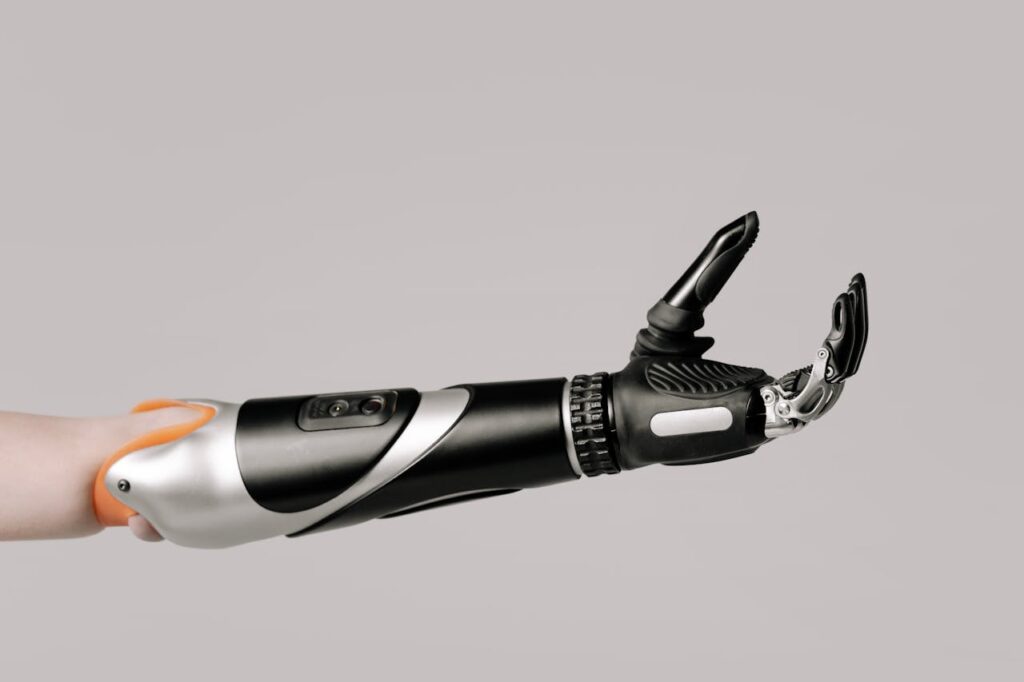
Building an Empowering Narrative
Ultimately, the psychological impact of limb loss is a story of resilience. Businesses in the prosthetics sector have the opportunity to play a transformative role in this narrative.
By combining empathy with innovative solutions, businesses can help veterans redefine their self-image, reclaim their independence, and embrace a future full of potential.
Every prosthetic provided is more than a product—it’s a lifeline for emotional recovery and a symbol of what’s possible. Businesses that take the time to address the psychological dimensions of prosthetic adoption not only improve outcomes for veterans but also position themselves as leaders in a truly human-centered industry.
Looking Ahead: The Future of Prosthetics for Veterans
The field of prosthetics is evolving rapidly, driven by advancements in technology and a deeper understanding of user needs. For war veterans, these developments promise even greater possibilities for independence and achievement.
Emerging Technologies
The integration of AI and robotics is transforming prosthetics into intelligent systems capable of anticipating user movements.
Features like myoelectric control, where muscle signals guide the prosthetic’s actions, are becoming more accessible. At Robobionics, we’re actively exploring these innovations to enhance the functionality of our products.

Holistic Solutions
Prosthetics of the future will go beyond physical restoration to address holistic well-being. From intuitive designs to seamless connectivity with digital devices, the goal is to make prosthetics an integral part of the user’s lifestyle.
Our team at Robobionics is dedicated to leading this charge, ensuring that veterans remain at the forefront of these advancements.
The Integration of AI and Machine Learning
Artificial intelligence (AI) and machine learning are poised to redefine the capabilities of prosthetics. These technologies enable prosthetic devices to learn and adapt to a user’s unique movements, creating a more intuitive and natural experience.
For veterans, this means smoother transitions between activities and better responsiveness during dynamic tasks.
Strategically, businesses can invest in developing AI-powered prosthetics that anticipate user needs. By analyzing data from sensors embedded in the device, AI can optimize grip strength, adjust for varying terrain, or even predict the user’s intended actions.
For example, a veteran climbing stairs would benefit from a leg prosthetic that adapts in real-time to the height and angle of each step.
Bionic Advancements and Neurological Integration
Bionic prosthetics represent a significant leap forward, allowing for direct communication between the prosthetic and the user’s nervous system. This approach enables unprecedented control, where veterans can perform intricate movements simply by thinking about them.
Advances in brain-computer interfaces (BCIs) are also opening doors to seamless integration between the body and prosthetics.
For veterans with complex injuries, this technology offers the potential to restore not only physical capability but also the sense of touch and proprioception (awareness of limb position).
The ability to feel textures, pressure, or temperature through a prosthetic could drastically enhance daily life.
Customization Through 3D Printing
The future of prosthetics will see even greater customization enabled by advancements in 3D printing. For veterans, this means faster production times, reduced costs, and highly personalized devices tailored to their unique anatomy and preferences.
3D printing also allows for the creation of lightweight yet durable prosthetics that enhance comfort and usability.
Businesses can leverage this technology to offer veterans bespoke solutions at competitive prices. Custom designs that incorporate both functionality and aesthetics can empower users to embrace their prosthetics as part of their identity.
A Day in the Life of a Veteran Using Prosthetics
To truly understand the impact of prosthetics, let’s explore what a typical day might look like for a veteran who has successfully adapted to a device like Grippy™. This perspective highlights the seamless integration of advanced prosthetics into daily routines, showing how they restore independence and enhance quality of life.
Morning Routines Made Effortless
For veterans, mornings often involve preparing for the day ahead, from personal hygiene to making breakfast. With the help of a prosthetic hand like Grippy™, tasks such as brushing teeth, tying shoelaces, or pouring coffee become manageable and intuitive.
The ergonomic design and advanced grip capabilities ensure that these activities are performed with precision and ease.
Work and Hobbies Reclaimed
Many veterans return to work or pursue hobbies as part of their reintegration into civilian life. A robust and functional prosthetic allows them to participate fully. For example, veterans who enjoy gardening can hold tools securely, while those in technical roles can manipulate small parts with precision.
Grippy™’s multi-grip modes and durable build make it suitable for a wide range of tasks, enabling veterans to reclaim their professional and personal passions.

Staying Active and Healthy
Physical fitness plays a vital role in overall well-being. Veterans who engage in sports or physical therapy benefit from prosthetics designed to handle high-impact activities.
Whether it’s jogging, swimming, or weightlifting, modern prosthetics like Grippy™ provide the strength and flexibility needed for an active lifestyle.
Social Engagements Without Barriers
Prosthetics also make social interactions more comfortable and inclusive. Veterans can shake hands, hold a drink, or interact naturally with their environment.
These seemingly simple actions have a profound impact on self-esteem, allowing veterans to connect with others without feeling self-conscious about their mobility.
The Importance of Continuous Support
While a well-designed prosthetic can transform a veteran’s life, ongoing support is crucial to ensure long-term success. At Robobionics, we are committed to providing the resources and care veterans need throughout their prosthetic journey.
Maintenance and Upgrades
Over time, prosthetics may require adjustments or upgrades to meet evolving needs. Robobionics offers local repair and maintenance services to keep devices functioning optimally.
Veterans can rely on our fast and efficient support, reducing the downtime that often accompanies imported prosthetics.
Lifelong Rehabilitation
Adaptation doesn’t end after the initial training phase. Lifelong rehabilitation programs can help veterans refine their skills, explore new capabilities, and stay comfortable with their prosthetics.
Our gamified rehabilitation approach keeps this process engaging and relevant, ensuring continuous improvement over time.
Conclusion
War veterans face extraordinary challenges, and their journey to recovery is a testament to their strength and resilience. Prosthetics tailored to their unique needs are more than medical devices—they are lifelines that restore mobility, confidence, and a sense of purpose.
Whether it’s performing daily tasks, pursuing career goals, or enjoying personal passions, the right prosthetic can empower veterans to embrace life with renewed vigor.
At Robobionics, we are driven by a commitment to provide veterans with innovative, affordable, and accessible solutions. From our advanced prosthetic designs like Grippy™ to our engaging rehabilitation programs, we focus on creating tools that integrate seamlessly into their lives.
With localized support and a user-first approach, we ensure that every veteran receives the care and technology they deserve.



